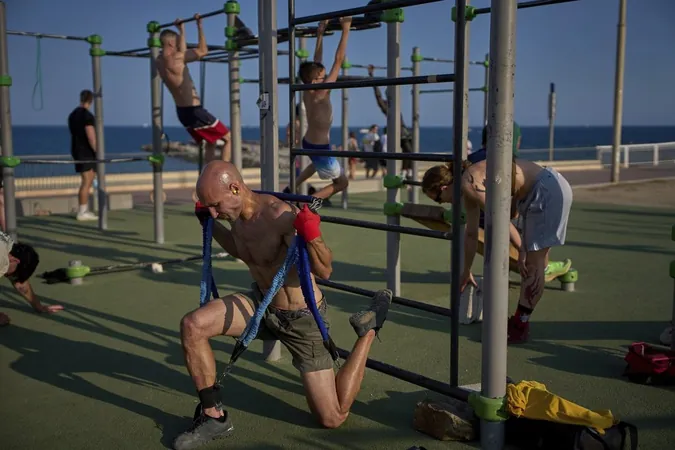
Bloc Québécois Aims for Official Opposition Position: Leader Promises Respect for All Canadians
2024-12-27
Author: Liam
OTTAWA — Bloc Québécois Leader Yves-François Blanchet is adopting a humble and focused approach as he considers the possibility of his party becoming the official Opposition in the next federal election. While he acknowledges that such an achievement would be "spectacular," he emphasizes that his priority is to earn the trust of Quebec voters rather than to revel in potential accolades.
In a recent year-end interview, Blanchet reflected on the current state of Justin Trudeau's minority government, which appears unstable amid declining Liberal support in polls. "Quebecers will give us a mandate," Blanchet stated confidently, pledging to fulfill it with a sense of responsibility and humility.
Recent projections from Canada338.com indicate that if an election were held today, the Conservatives, led by Pierre Poilievre, would secure a significant majority of 232 seats. The Bloc Québécois is positioned as the runner-up with 45 seats, surpassing the Liberals and the NDP.
Should these projections hold true, the Bloc would find itself in a unique position as the Loyal Opposition under King Charles III, with Blanchet potentially assuming residence at Stornoway, the official home for opposition leaders. He noted that while the Bloc has a stance against the monarchy and the Senate, their aim will be to engage constructively rather than disrupt. "We respect institutions. We are not here to break the toys," he asserted.
With Quebec sovereignty at the forefront of the Bloc’s agenda, Blanchet expressed a desire to maintain a "positive and constructive attitude" while advocating for the province's interests. He clarified that while the Bloc will continue to address issues relevant to all of Canada, they will prioritize topics of particular relevance to Quebec. Blanchet reassured English Canadians that they need not fear the Bloc, stating, "What’s good for Quebec is often good for Canada."
Highlighting his party's commitment, he referenced their battles to increase Old Age Security for younger seniors and protect supply management in trade agreements. Blanchet also expressed appreciation for past efforts in tackling complex issues such as hate speech and religious exemptions within the Criminal Code.
When asked about the potential dynamics of a larger Bloc contingent versus a medium-sized one that holds the balance of power, he acknowledged the strategic advantages of both. However, he remains committed to securing as many seats as possible. "A very strong Bloc Québécois delegation forces any government to respect what Quebec wants," he explained, pointing to Trudeau’s government’s failures to adequately represent Quebec as a key factor in their projected loss of seats in the province.
Historically, the Bloc Québécois has only served as the official Opposition once before, in 1993. The party was founded by Lucien Bouchard and won 54 seats in its inaugural election, successfully drawing attention to Quebec issues.
As the NDP signals its intention to bring down Trudeau’s government, Blanchet remains resolute in his opposition, vowing not to support the Liberals. He has emphasized the importance of addressing a wide range of critical issues in the upcoming election, including trade, economic management, and social concerns.
Reflecting on his strategy in the House of Commons, Blanchet concluded that he does not regret allowing the Conservatives to impede parliamentary work, suggesting that caving to government demands without yielding results would undermine the Bloc’s standing. "If we want to be respected, we have to act accordingly," he remarked.
In his closing thoughts, he recognized the need for clearer communication from politicians to help the public better understand their motives. "Our work doesn't mean anything if people don't understand us," he added, advocating for patience and clarity in political discourse.
As the political landscape evolves, all eyes will be on the Bloc Québécois—an essential player in determining the fate of the next federal election and the direction of Canadian politics.









 Brasil (PT)
Brasil (PT)
 Canada (EN)
Canada (EN)
 Chile (ES)
Chile (ES)
 Česko (CS)
Česko (CS)
 대한민국 (KO)
대한민국 (KO)
 España (ES)
España (ES)
 France (FR)
France (FR)
 Hong Kong (EN)
Hong Kong (EN)
 Italia (IT)
Italia (IT)
 日本 (JA)
日本 (JA)
 Magyarország (HU)
Magyarország (HU)
 Norge (NO)
Norge (NO)
 Polska (PL)
Polska (PL)
 Schweiz (DE)
Schweiz (DE)
 Singapore (EN)
Singapore (EN)
 Sverige (SV)
Sverige (SV)
 Suomi (FI)
Suomi (FI)
 Türkiye (TR)
Türkiye (TR)
 الإمارات العربية المتحدة (AR)
الإمارات العربية المتحدة (AR)